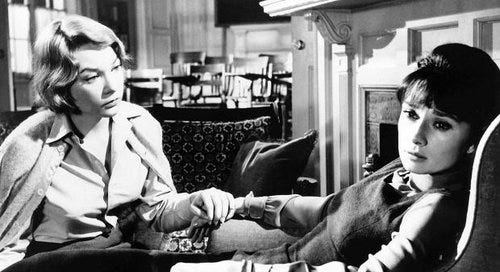Directed: William Wyler
Written: John Michael Hayes (From the play by Lillian Hellman)
As heartbreaking an experience as I think I'll ever have in cinema, The Children's Hour is a perfect reminder of lesbian film in its infancy.
One of the first in a long tradition of "Lesbian Martyr" films, this classic practically defined lesbian angst. Not once is the word lesbian mentioned, but as modern filmmakers are now re-discovering, there can be a great deal of power in not naming things. The word lesbian sits in the atmosphere like a cold chill, and no one, especially not the woman who actually believes she is one, dares say the word aloud.
The story takes place in a small, girls boarding school run by two old friends, Martha (Shirley Maclaine) and Karen (Audrey Hepburn). Trouble starts when a mischievous student, trying to escape from just punishment, invents a story that the two schoolteachers are having an "unnatural relationship" and blackmails a fellow student into corroborating the lie. When the story is told to the child's rich grandmother, she rallies the entire town against the two unsuspecting teachers, who are forced to go to court in an attempt to clear their names and their reputations.
Karen is engaged to marry the nephew of the old lady who is making the accusations, but her reluctance to set a date, ostensibly because she needs to devote all her attention to the fledgling school. This adds fuel to the fire when the rumours emerge, until even her fiancé Joe (James Garner) begins to believe that there might be some truth to the accusations.
The real tragedy lies in the fact that Martha realises, through the course of the struggle to clear their names, that she does indeed love Karen, and that she is all the things that people say she is. Ashamed and fearful of her own urges, she confesses her feelings to Karen, and begins an emotional spiral into despair.
Shirley Maclaine stated much later on (in the documentary The Celluloid Closet) that she doesn't believe that Martha would have really given up so easily, not even then. After spending her whole life fighting for everything she had, Martha's instinct would have been to fight for Karen, to defy disapproval and stand up for herself. Unfortunately that wasn't the way film worked in those days.
Even though I knew it was hopeless, I hung on to the very end with an insane belief that Karen would just turn around and kiss Martha, admitting she didn't love Joe, that they had always belonged together after all. Even as I heard the music swelling that indicated tragedy in the works, I could feel my mind rebelling, fighting against the Hollywood inevitability.
I watched The Children's Hour in a cinema full of lesbians at a film festival retrospective screening, and it was like being at a late night, audience participation Rocky Horror Picture Show. People hissed at the screen when the troublemaking brat appeared. We all held our collective breaths as Martha confessed her lonely, dark secret. We yelled at Karen to hurry as she climbed those stairs to see Martha at the end, as if our cries could somehow stop the inevitable from happening. And as Audrey Hepburn walked through the gates of the school for the last time we cried with the hopelessness of it all.
How far we have come in lesbian film? How grateful I am that films like this existed to help pave the way, even though they leave a deep, dark pit of dissatisfaction in our hearts to watch them? I have nothing but praise for both these actresses for taking on such unglamourous roles and to Lillian Hellman for her magnificent play. The actresses had fantastic chemistry, we wanted them to live happily ever after. As Shirley Maclaine basically said herself, I think they would have liked that too.





